- Home
- E. M. Foner
Carnival On Union Station (EarthCent Ambassador Book 5) Page 5
Carnival On Union Station (EarthCent Ambassador Book 5) Read online
Page 5
“Yes, thank you,” Joe responded. Those were the last intelligible words any of them uttered for a few minutes while the food disappeared.
“Didn’t realize I was that hungry,” Woojin said, breaking the conversational drought. “It’s too bad your wife had the election thing tonight, Joe. I’m looking forward to meeting her.”
“You’ll see her in a couple hours,” Joe told him. “You’re staying with us, of course.”
“I appreciate that, Joe, but I already have a hotel reservation. I’ve always wanted to try a fancy resort, and I won a voucher for Club Asia on Union Station in the passenger lottery, on the trip to Echo Station to auction off my gun collection. You must have seen their ads, right?”
“Why settle for five stars when you can have nine tails?” Lynx repeated the tagline from the luxury hotel chain ad. “What does that even mean?”
“The nine-tailed fox is an important spirit in the Eastern cultures from back on Earth,” Woojin explained. “In Korea, it’s Gumiho, in Japan, the Kitsune, in China the Huli jing. The Gumiho is a shape-shifter that often transforms into a beautiful woman to seduce young men so it can eat their livers or their hearts.”
“And getting eviscerated is your idea of a luxury vacation?” Lynx followed up.
“We all have to go sometime, it’s just a question of how,” the ex-mercenary replied complacently. “So, are the three of you the brain trust for this organization?”
“Uh, actually my wife sort of manages things from behind the scenes,” Clive readily admitted. “She couldn’t be here this evening because she’s working on getting Joe’s wife elected for the Carnival thing.”
“I see there’s no shortage of action in EarthCent Intelligence,” Woojin commented. “Are you going to need me to sabotage some floats or assassinate a beauty queen?”
Lynx laughed and snorted at the same time, a mistake while trying to swallow beer, which subsequently came out of her nose.
“I guess we can’t compete with the excitement of working as a caravan guard,” Joe countered, pouring another round from the refilled pitcher.
“Low blow,” Woojin responded. “Besides, that consortium work has been drying up as the new trade routes become established. Amazing what a game can do for interspecies relations. One of the reasons I left last month was I couldn’t face another one of those idiotic Vergallian wars of succession. I’m too old to lead a cavalry charge on a tech-ban world.”
“I’m going to guess you’re interested enough for us to move on to the next bit,” Clive said. He unlatched a heavy metal bracelet from his wrist, pushed on a combination of metal studs, and laid it on the table. “Drazen tech. It will make the conversation reasonably private.”
“Reasonably?” Woojin asked.
“I assume that the Drazens can listen in if they want to, it only makes sense. But they’re our allies, and what I’m going to tell you about now is more sensitive than secret.”
“Our Gem problem?” Lynx guessed. “Oops, sorry. I keep forgetting that it’s not a test.”
“I don’t know if you’ve had any dealings with the Gem in your career, Woojin, but we’re told they’ve been one of the more stable species on the station network since they joined after, uh, consolidating their gene pool to one individual through civil war,” Clive said. “For some reason we don’t understand, Gem looks to be heading into another civil war, this time against themselves, or rather, herself. The Gem dissidents, the Free Gem, are highly distrustful of everybody who is part of the galactic status-quo, which they understandably believe has ignored, if not actively supported, the rule of the Gem elite.”
“Came up against them in one of my early outings,” Woojin replied, searching his memory for details. “Can’t say it’s anything I’m proud of, basically a raid on one of their mining outposts for rare minerals. I’m not even sure who was paying us, though the rumor was that they were a group of artificials from one of the manufacturing orbitals. Outpost was well outside of Stryx space, of course, so none of the normal rules applied.”
“What happened?” Lynx asked.
“We finessed the ground part of the operation. They probably thought nobody knew about the mines because they were pretty new and the star system didn’t have any planets with breathable atmospheres. We hit the ground in armored spacesuits and the mine workers didn’t try to argue, but by the time we loaded up the shuttles and got back into space, there were some Gem fleet elements already closing on our transport.”
“Your transport a raider or a capital ship?” Clive asked.
“Old Horten cruiser. The crew who subcontracted us for the ground work must have stolen it out of a mothball orbit or bought it military surplus,” Woojin continued. “Ship was already old when humans looked up at the stars and thought they were revolving around the Earth on a big glass shell. And it didn’t have much for modern weaponry either, just some basic rail guns and high-energy beam weapons which were so integrated into the hull that you couldn’t pull them out without turning the ship into scrap.”
“Did your captain employ discretion?” Joe asked, using the mercenary code word for running away.
“No, he didn’t even change colors,” Woojin replied, chuckling at the thought. “Captain and crew were mainly renegade Horten, and do I ever miss playing poker with those boys. We were outnumbered three to one, though two of the Gem ships were smaller, maybe light cruiser class, but the Hortens kept banging away at them for a good hour until we were far enough out of the planet’s gravity well to jump. I don’t know if the Gem caught up with the ship at some later date or went after our employers, maybe they figured there had already been enough shooting to satisfy their honor.”
“I don’t get it,” Lynx said. “The Gem ships were regular navy and they couldn’t inflict serious damage on an outdated Horten cruiser? I though those species were more or less tech-equivalent.”
“Ten thousand years ago, maybe,” Woojin replied. “Might also be that the Gem who engaged us were given obsolete units and relegated to patrolling low-value outposts, I don’t know. But the Horten captain claimed that the Gem navy was stagnant, that they hadn’t kept up with equiv-tech species for a long time, and that they weren’t buyers on the open market.”
“That matches what I’ve been hearing lately,” Clive observed. “For thousands of years the Gem have been pouring all of their resources into cloning more Gem, but they don’t seem to be advancing otherwise. In fact, our analysts suggest that they are actually moving backwards in some areas, like abandoning fresh food for a manufactured substitute. Although they’re on the tunnel network, they’re practically invisible in the galactic economy.”
“But you didn’t invite me here to see if I had any stories about the Gem floating around in my memory,” Woojin reminded them. He poured himself about a third of a glass, which finished the second pitcher. Joe signaled to the waitress.
“There are about forty billion Gem spread around the galaxy, mainly in large clumps since they keep to themselves,” Clive continued. “We know that increasing numbers have been fleeing the Gem Empire, despite the internal security apparatus, and some are trying to form an organized resistance. Although most humans have a visceral dislike for the clones, the Free Gem see us as potential allies.”
“They look up to my wife for some reason,” Joe added.
“So you’re worried that humans will get mixed up in a Gem civil war and then become targets?” Woojin asked.
“The Stryx won’t let any war spread onto the tunnel network, of course, but there are plenty of isolated human communities on farming and mining colonies, some of them well outside of Stryx space,” Lynx pointed out. “If the Gem military gets nasty, especially if it looks like things are going against them, they might try for revenge.”
“The Empire Gem I’ve met with Kelly at diplomatic events seem to take everything personally,” Joe added. “Inferiority complex you could ride a horse through.”
“So you’re mainly thinking about
contingency planning, maybe getting an early warning system in place, making sure that the isolated humans know what’s going on.” Woojin took the silence to be assent and drummed his fingers on the table. “I’m still going to spend the night in Club Asia,” he said finally. “I’ll come around and visit tomorrow when the kids are awake, Joe.”
“Does that mean you took the job?” Lynx asked.
“Until I quit or you fire me,” Woojin replied. “I guess I can put off exploring the galaxy on my own for a while. It probably wouldn’t have been that interesting anyway.”
“It’s mainly exercise machines in Zero-G and eating out of squeeze tubes,” Lynx concurred. “And no beer.”
Six
“What are they doing?” Metoo asked Dorothy. The girl and the young Stryx were crossing Mac’s Bones to visit Dring, but on the way to the disguised passage through the scrap pile, they paused for a moment to watch Joe working with a new class of EarthCent Intelligence recruits.
“Daddy says it’s drilling, but they never actually make holes in anything,” Dorothy explained. “They mainly shout and run in small circles. They don’t bump into each other so much after the first week.”
“Why do spies need to learn how to shout and run in small circles?” Metoo inquired.
“I don’t know,” Dorothy answered. “Maybe it’s secret.”
“Oh, that makes sense,” the young Stryx acknowledged. “All of the biologicals on the stations have secrets, except for the humans, and that’s only because you aren’t very good at keeping them.”
“Am too!” Dorothy rebutted her friend, then immediately turned and fled through the camouflaged opening in the scrap heap and down the welded tunnel.
Metoo floated right behind her, but he couldn’t pass in the narrow space without risking giving her a fright, and the regulation ten-second statute of limitations expired long before he could get in front of her to retort with “Are not!” Jeeves had assured Metoo that most of the conversational rules Dorothy taught the young Stryx were fabrications of her overactive imagination, but it was still fun.
Dring was busy welding when the children emerged from the tunnel, and Dorothy, who had grown up with a father who was always doing ship repairs, immediately looked away.
“Don’t look, Metoo,” she ordered her friend. “You can hurt your eyes.”
“I don’t really have eyes,” Metoo explained for the twenty-sixth time, though his patience was nowhere near spent. He didn’t bother telling Dorothy that it was the twenty-sixth time she had warned him about watching a weld in progress because he knew from experience that she wouldn’t believe him. Although the ten-year-old girl was extremely bright and had an excellent memory for subjects that interested her, like alien foods and the outfits worn by the dolls in the Little Apple antique store, she treasured her misconceptions with equal tenacity.
Dring sensed the visitors, but he knew it wasn’t anything urgent since Metoo didn’t interrupt him. The artist kept his attention on the work and continued welding until he finished the bead. Once it was done, he allowed the electrical arc to die with a final sputter and turned to greet his visitors.
“Dorothy! Metoo! What a pleasant surprise.” The chubby dinosaur put the tools aside and waddled forward to meet the youngsters. Dorothy ran towards him and threw herself against his soft belly with a thud.
“Mommy said you have to come for dinner,” Dorothy informed him.
“The ambassador said to ask Dring if he would come for dinner,” Metoo corrected her.
“I know THAT,” Dorothy replied in disgust. “But he’s more likely to come if he HAS TO.”
“You can’t argue with her logic,” Dring told the little Stryx. “You can tell your Mommy that I accept her invitation or that I shall come as she has ordered. I leave it up to your good judgment.”
“Can we go inside, Uncle Dring?” Dorothy pleaded, hanging on to one of the dinosaur’s palms. She carefully avoided the blunt claws, which she worried must hurt him since they were often chipped or broken.
“Of course you may,” Dring replied graciously. “Thank you for remembering to ask first.”
Dorothy raced to the section of the gravity surfer’s transparent hull that served as a door and stepped confidently inside. Dring followed and Metoo floated politely behind. A humanoid girl whom Dorothy had never met before was sitting on the bench by the little pond, and she looked up, startled, as Dorothy approached.
“Who are you?” Dorothy asked without hesitation. “Are you Dring’s daughter? Do you want to come to dinner?”
“She can’t understand you,” Dring called from a dozen steps away. “She’s a Gem refugee and she doesn’t have an implant.”
Dorothy carefully studied the unexpected competition for Dring’s attention. The girl looked strangely familiar but somehow unfinished to the ambassador’s daughter, who was proud of her ability to recognize as many species as her mother.
As Dring approached, Metoo floated out from behind him, and the Gem girl jumped up as if she was about to flee.
“It’s just Metoo,” Dorothy said, forgetting that the other girl couldn’t understand her.
“We don’t trust the Stryx,” the Gem said shakily. “Please, Dring, make him leave.”
“Metoo, could you wait outside?” Dring requested. The Stryx obediently turned and slipped back out of the gravity surfer. “I assure you, young Gem, that the Stryx are entirely harmless, but as you can see, we respect your concerns.”
“Why should she understand you and not me?” Dorothy demanded.
“I’m speaking Gem and your new translation implant is giving you the English, just like when she speaks. But you don’t speak Gem, so I would have to translate for you.”
Dorothy frowned and shook her head in irritation. “Like the translation boxes we used on Kasil?” she asked. Imagining Dring filling the role of that clunky technology made her giggle.
“I would be honored,” Dring offered. “I’d feel better if young Gem here could find a friend. It’s very rare for clones to leave their crèche worlds before they reach adulthood. She visits me sometimes when the Free Gem are at work.”
“What’s your name?” Dorothy asked, and then listened critically as Dring repeated the question for her.
“Gem,” the girl replied.
“That’s not a name,” Dorothy scolded her, “I mean like, Sue, Betsy, Matilda, Sarah or Gwendolyn. You know, a REAL name.”
Dring repeated Dorothy’s words and the Gem girl looked at him in puzzlement, as if she doubted the accuracy of the translation.
“I could give you my number,” the Gem offered. “It’s thirty-eight billion, six…”
Dorothy cut the young clone off mid-digit. “If you don’t have a real name, we’ll have to give you one,” she insisted. “Are there any names you like?”
This question brought an even more bewildered look. Finally she answered, “My sisters don’t use names. We just know each other.”
“Then I’m going to call you, Mist,” Dorothy declared after a second’s hesitation. “It’s short for mystery, because your name is a mystery.”
“Mist,” the girl repeated after Dring translated. “I like it. What’s your name?”
“Dorothy,” Kelly’s daughter replied, and in imitation of her mother’s diplomatic introductions, stepped forward to shake the other girl’s hand. After a moment, the clone extended her own hand, which Dorothy pumped enthusiastically, putting her free hand over the top like a real politician. Both girls smiled.
“Do you want to play with me and Metoo?” Dorothy asked, now that the formalities were out of the way. Dring took a minor liberty with the translation for the sake of clarity, substituting “my little Stryx friend” for “Metoo.”
Mist immediately looked uncomfortable again, but rather than rejecting the proposal out of hand, she asked, “Are you sure he’s not working with the bad Gem?”
“Metoo doesn’t work for anybody. He’s just a kid, like us,” Dorothy replied
. She either forgot or selectively ignored the fact that her young friend had served two years as the High Priest of Kasil to help save the Kasilian race from extinction.
“I promise that Metoo will be a good friend,” Dring added after translating. “I doubt he has ever even met one of your sisters from the Empire. And he can tell you what Dorothy is saying if I’m not there.”
“I guess,” Mist decided after weighing the options. “But we have to keep it a secret so I don’t get into trouble.”
“Ooh, I’m very good at keeping secrets,” Dorothy said, seizing the other girl’s hand again. “Besides, you can tell everybody that Metoo is playing with me and that you’re ignoring him.”
This formulation put Mist’s worries to rest, and the two girls went out to find the little robot, who appeared to be studying Dring’s sculptures with great interest. The shape-shifting artist followed behind, and after seeing the Gem accept Metoo’s hesitant greeting without getting upset, Dring returned to work, leaving the children to their own devices.
“I like Dring’s statues,” Mist informed her two new friends. “I asked him to make one of me and he said he would.”
“Oh!” Dorothy exclaimed, suddenly jealous. “I never thought of that. I’ll do that too.” Suddenly, she became shy and asked, “Are you really a clone?”
“Of course,” Mist replied after listening to Metoo’s translation. “We’re all clones, that’s where new people come from. Are you sure you’re not a clone?”
“I don’t think so,” Dorothy answered cautiously, floored by the question. “I don’t have any sisters. I know that when my baby brother was born, he came out of Mommy’s stomach.”
“Your mother ate your baby brother?” Mist asked in horror when Metoo finished translating.
“No!” Dorothy protested. “The stork put him in there. It’s complicated, though. We can’t understand until we’re older.”
“That’s alright,” Mist said. “Lots of things are complicated. Sometimes, I think the adults don’t really know the answers so they just say that.”

 Last Night on Union Station (EarthCent Ambassador Book 16)
Last Night on Union Station (EarthCent Ambassador Book 16)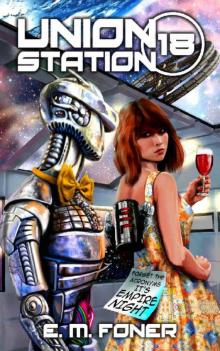 Empire Night on Union Station (EarthCent Ambassador Book 18)
Empire Night on Union Station (EarthCent Ambassador Book 18)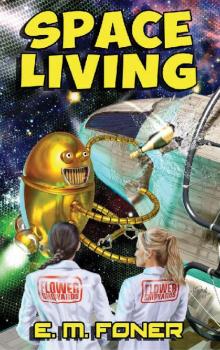 Space Living (EarthCent Universe Book 4)
Space Living (EarthCent Universe Book 4)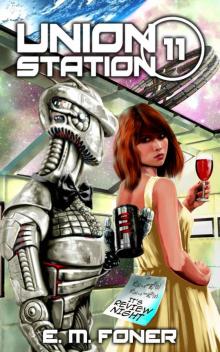 Review Night on Union Station (EarthCent Ambassador Book 11)
Review Night on Union Station (EarthCent Ambassador Book 11) Assisted Living
Assisted Living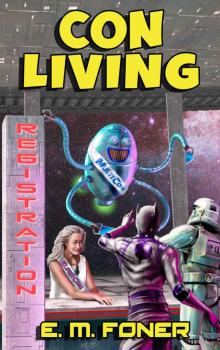 Con Living
Con Living Freelance On The Galactic Tunnel Network
Freelance On The Galactic Tunnel Network Career Night on Union Station
Career Night on Union Station Career Night on Union Station (EarthCent Ambassador Book 15)
Career Night on Union Station (EarthCent Ambassador Book 15) Word Night on Union Station (EarthCent Ambassador Book 9)
Word Night on Union Station (EarthCent Ambassador Book 9)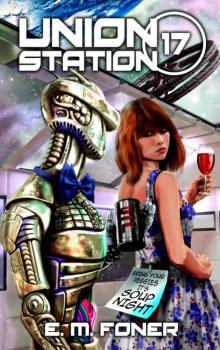 Soup Night on Union Station
Soup Night on Union Station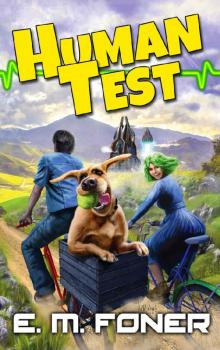 Human Test
Human Test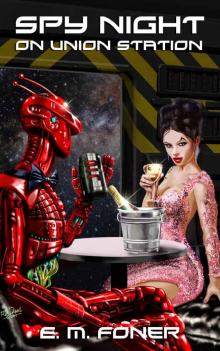 Spy Night on Union Station (EarthCent Ambassador Book 4)
Spy Night on Union Station (EarthCent Ambassador Book 4)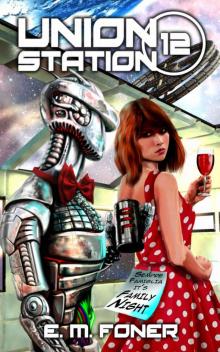 Family Night on Union Station (EarthCent Ambassador Book 12)
Family Night on Union Station (EarthCent Ambassador Book 12) Party Night on Union Station (EarthCent Ambassador Book 10)
Party Night on Union Station (EarthCent Ambassador Book 10)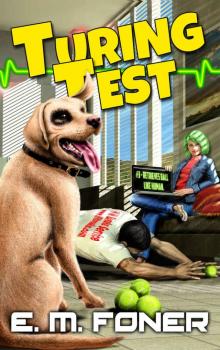 Turing Test
Turing Test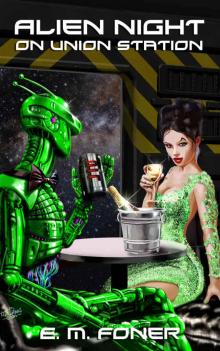 Alien Night on Union Station (EarthCent Ambassador Book 2)
Alien Night on Union Station (EarthCent Ambassador Book 2) Wanderers On Union Station (EarthCent Ambassador Book 6)
Wanderers On Union Station (EarthCent Ambassador Book 6) Vacation on Union Station (EarthCent Ambassador Book 7)
Vacation on Union Station (EarthCent Ambassador Book 7)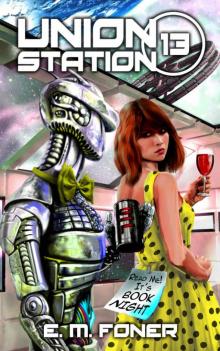 Book Night on Union Station (EarthCent Ambassasor 13)
Book Night on Union Station (EarthCent Ambassasor 13)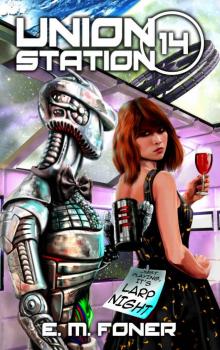 LARP Night on Union Station
LARP Night on Union Station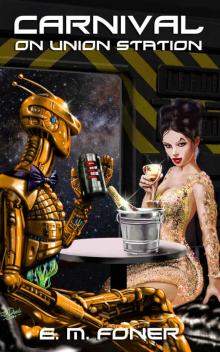 Carnival On Union Station (EarthCent Ambassador Book 5)
Carnival On Union Station (EarthCent Ambassador Book 5)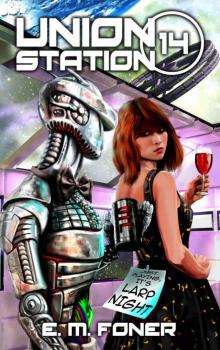 LARP Night on Union Station (EarthCent Ambassador Book 14)
LARP Night on Union Station (EarthCent Ambassador Book 14)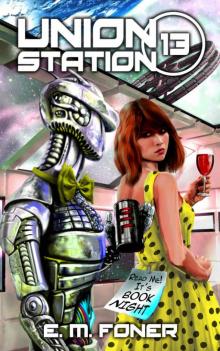 Book Night on Union Station
Book Night on Union Station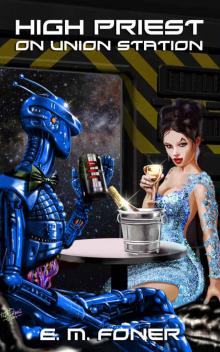 High Priest on Union Station (EarthCent Ambassador Book 3)
High Priest on Union Station (EarthCent Ambassador Book 3)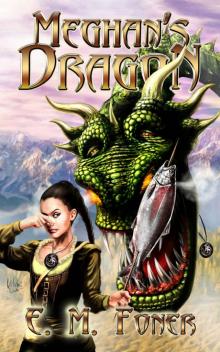 Meghan's Dragon
Meghan's Dragon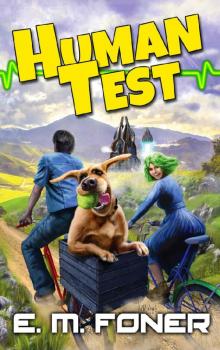 Human Test (AI Diaries Book 2)
Human Test (AI Diaries Book 2)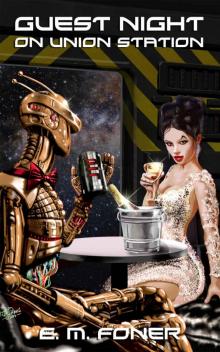 Guest Night on Union Station
Guest Night on Union Station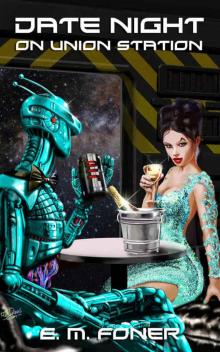 Date Night on Union Station
Date Night on Union Station